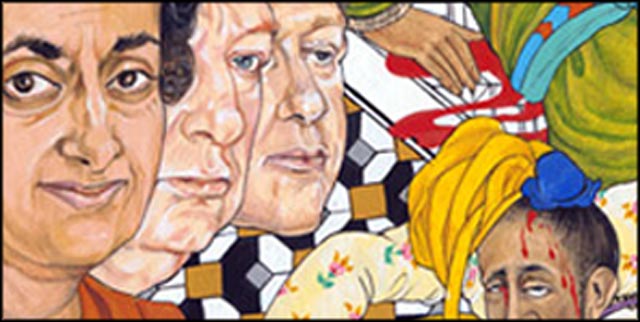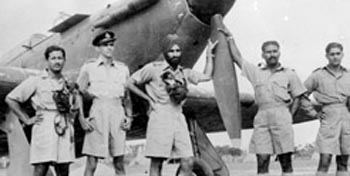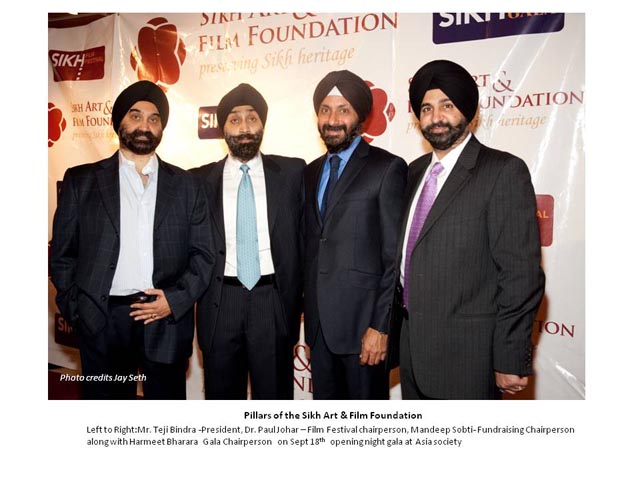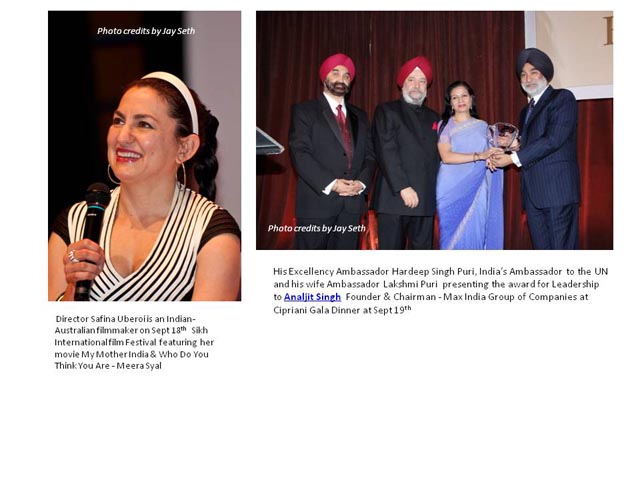1984 and Other Sikh Stories
<small>By Lavina Melwani • Sep 29th, 2009 • Category: 24/7 Talk is Cheap - The Blog</small> Nineteen-Eighty-Four
Nineteen-Eighty-Four
If there’s one panacea for broken spirits and hearts, it is cinema. Cinema, when done well, can heal wounds, probe motivations and even foster debate. It’s hard to believe that 25 years have passed since the anti-Sikh riots of 1984, for the hurts still linger. Over the past few years the Sikh community has worked to get the word out, and in a post 9/11 world, it’s become increasingly important to talk of the Sikh culture and identity.
The Sikh Art and Heritage Foundation, headed by Tejinder Singh Bindra, has found film to be a great communicator and with Film Festival Chairperson Dr. Paul Johar, the organization once again spearheaded the Sikh International Film Festival. A trio of films on the opening night at Asia Society each brought a new perspective to the story of the Sikhs.
In ‘1984 and the Via Dolorosa Project’the Singh Twins use paint and brush to tell the horror story of the mass tragedy when innocent Sikhs were murdered in the aftermath of Prime Minister Indira Gandhi’s assassination. This dramatic film, told through the miniatures painted by Amrit and Rabindra K.D.Kaur Singh, is a breathtaking and highly subjective film on the tragedy that erupted in 1984. You can see more of their unique art at www.singhtwins.co.uk
The noted artists explore 1984 through images and video footage along with details from their painting ‘Nineteen Eighty Four’ to talk about this defining issue which has changed life for Sikhs. In this film project, they draw parallels between the atrocities and human rights abuses of 1984 and the Christian tradition of the Via Dolorosa – the crucifixion of Jesus Christ.
The powerful film conjures up the horror of 1984 through the details of the painting by the twin sisters, and cannot fail to move the viewers. To an objective viewer the story does seem to leave out certain details but as the Singh sisters admitted, they were only giving their subjective viewpoint. That there is still not closure on the issue was evident from the highly charged audience comments during the question and answer session after the film was shown at the Asia Society.
On a more positive note is the documentary ‘Flying Sikhs: A History of Sikh Fighter Pilots’, directed by Navdeep Kandola. Few people know of the remarkable story of Sikh fighter pilots in World War 1 and II, and the immense bravery that has kept them in the forefront in defending the country. Drawing on interviews with the last remaining pilots, rare and personal archive materials, and unseen footage, Flying Sikhs pays testimony to the brave and selfless contributions these unsung heroes made to the war efforts across the world.
For many viewers this will be an eye-opener as they learn of the first ever Indian pilot in WWI, Hardit Singh Malik, who survived the war and later became the prime minister of Patiala and went on to become the High Commissioner to both Canada and France. Archive footage brings those heady times back to the audience. The film also includes interviews with other Sikh pilots of World War II, Air Chief Marshall Arjan Singh DFC and Mohinder Singh Pujji DFC, now both in their 90’s.
The third film came from yet another perspective and told a powerful tale of loss and inheritance – ‘My Mother India’. This film introduces a unique new voice, Indian-Australian director Safina Uberoi, who looks through an unswerving lens at the life lived by her Australian mother and Sikh father in India, even as the tragedy of 1984 unfolded. It is a tale told with humor and honesty and makes one wonder about identity and self, and who is a true Sikh and a true Indian? Living for many years in India, her mother is probably more Indian than many Indians who live physically – or mentally – in the West. In the end, each family is unique with its own unique story and that is the charm of this offbeat film. This endearing film speaks in a universal language and has won 11 major international awards including the Australian Film Critics Circle Award for Best Australian Documentary.
 Flying Sikhs
Flying Sikhs
The film festival also showed several documentaries and shorts, and the award winners were ‘A Warrior’s Religion’ by Mani Amar and ‘The Unravelling’ by Kuldip Powar. The awards were presented at the Sikh Heritage Gala at Cipriani, with music, festivities and celebrities.
The Sikh community is reaching out to friends and strangers, sharing their stories. The three films certainly touched a universal chord – after seeing the angst and mayhem of 1984, the bravado of the Flying Sikhs, and a family’s search for home and identity in ‘My Mother India’ – one cannot but see the commonality of the human connection, and realize that there is a bit of the Sikh in all of us.
Photos: Sikh Art & Film Foundation


<small>By Lavina Melwani • Sep 29th, 2009 • Category: 24/7 Talk is Cheap - The Blog</small>
 Nineteen-Eighty-Four
Nineteen-Eighty-FourIf there’s one panacea for broken spirits and hearts, it is cinema. Cinema, when done well, can heal wounds, probe motivations and even foster debate. It’s hard to believe that 25 years have passed since the anti-Sikh riots of 1984, for the hurts still linger. Over the past few years the Sikh community has worked to get the word out, and in a post 9/11 world, it’s become increasingly important to talk of the Sikh culture and identity.
The Sikh Art and Heritage Foundation, headed by Tejinder Singh Bindra, has found film to be a great communicator and with Film Festival Chairperson Dr. Paul Johar, the organization once again spearheaded the Sikh International Film Festival. A trio of films on the opening night at Asia Society each brought a new perspective to the story of the Sikhs.
In ‘1984 and the Via Dolorosa Project’the Singh Twins use paint and brush to tell the horror story of the mass tragedy when innocent Sikhs were murdered in the aftermath of Prime Minister Indira Gandhi’s assassination. This dramatic film, told through the miniatures painted by Amrit and Rabindra K.D.Kaur Singh, is a breathtaking and highly subjective film on the tragedy that erupted in 1984. You can see more of their unique art at www.singhtwins.co.uk
The noted artists explore 1984 through images and video footage along with details from their painting ‘Nineteen Eighty Four’ to talk about this defining issue which has changed life for Sikhs. In this film project, they draw parallels between the atrocities and human rights abuses of 1984 and the Christian tradition of the Via Dolorosa – the crucifixion of Jesus Christ.
The powerful film conjures up the horror of 1984 through the details of the painting by the twin sisters, and cannot fail to move the viewers. To an objective viewer the story does seem to leave out certain details but as the Singh sisters admitted, they were only giving their subjective viewpoint. That there is still not closure on the issue was evident from the highly charged audience comments during the question and answer session after the film was shown at the Asia Society.
On a more positive note is the documentary ‘Flying Sikhs: A History of Sikh Fighter Pilots’, directed by Navdeep Kandola. Few people know of the remarkable story of Sikh fighter pilots in World War 1 and II, and the immense bravery that has kept them in the forefront in defending the country. Drawing on interviews with the last remaining pilots, rare and personal archive materials, and unseen footage, Flying Sikhs pays testimony to the brave and selfless contributions these unsung heroes made to the war efforts across the world.
For many viewers this will be an eye-opener as they learn of the first ever Indian pilot in WWI, Hardit Singh Malik, who survived the war and later became the prime minister of Patiala and went on to become the High Commissioner to both Canada and France. Archive footage brings those heady times back to the audience. The film also includes interviews with other Sikh pilots of World War II, Air Chief Marshall Arjan Singh DFC and Mohinder Singh Pujji DFC, now both in their 90’s.
The third film came from yet another perspective and told a powerful tale of loss and inheritance – ‘My Mother India’. This film introduces a unique new voice, Indian-Australian director Safina Uberoi, who looks through an unswerving lens at the life lived by her Australian mother and Sikh father in India, even as the tragedy of 1984 unfolded. It is a tale told with humor and honesty and makes one wonder about identity and self, and who is a true Sikh and a true Indian? Living for many years in India, her mother is probably more Indian than many Indians who live physically – or mentally – in the West. In the end, each family is unique with its own unique story and that is the charm of this offbeat film. This endearing film speaks in a universal language and has won 11 major international awards including the Australian Film Critics Circle Award for Best Australian Documentary.
 Flying Sikhs
Flying SikhsThe film festival also showed several documentaries and shorts, and the award winners were ‘A Warrior’s Religion’ by Mani Amar and ‘The Unravelling’ by Kuldip Powar. The awards were presented at the Sikh Heritage Gala at Cipriani, with music, festivities and celebrities.
The Sikh community is reaching out to friends and strangers, sharing their stories. The three films certainly touched a universal chord – after seeing the angst and mayhem of 1984, the bravado of the Flying Sikhs, and a family’s search for home and identity in ‘My Mother India’ – one cannot but see the commonality of the human connection, and realize that there is a bit of the Sikh in all of us.
Photos: Sikh Art & Film Foundation

